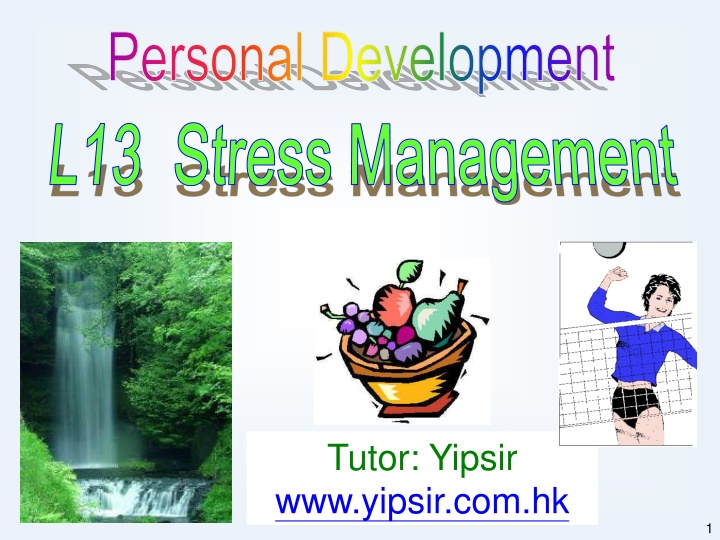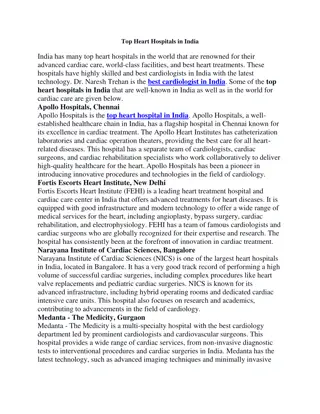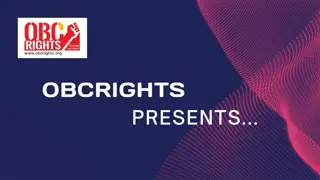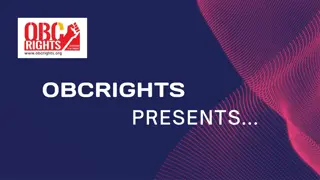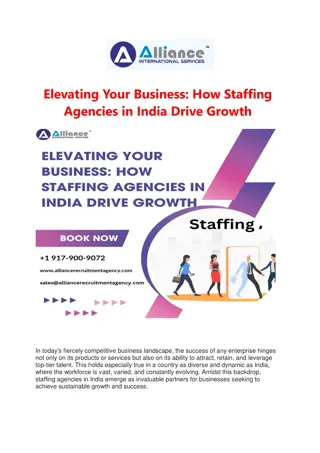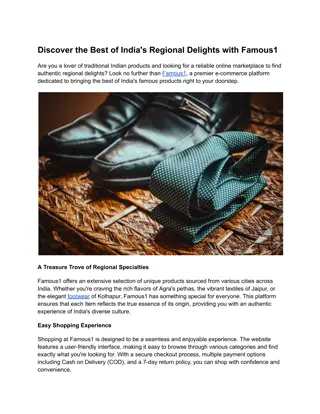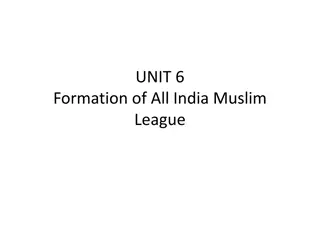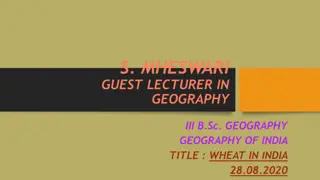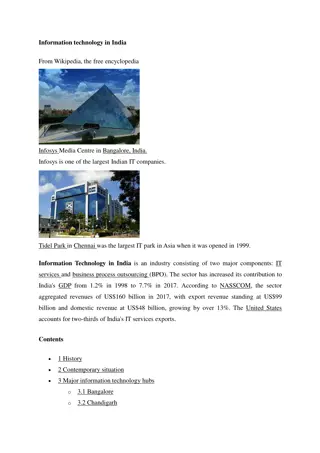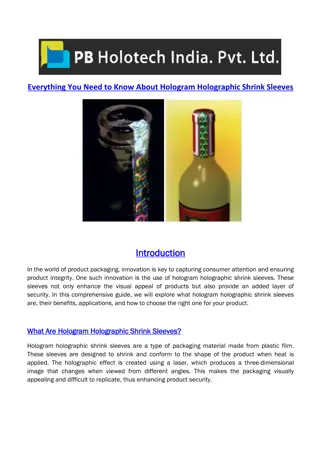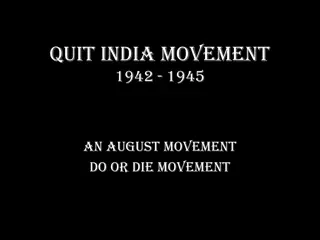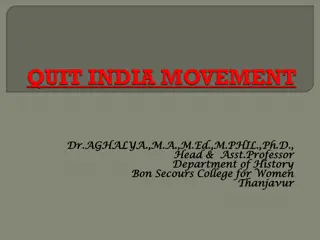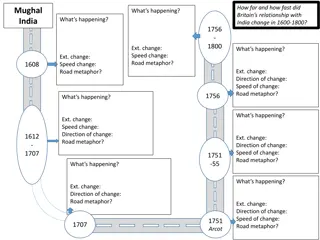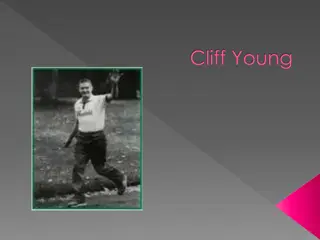Discover Incredible India
India, a land of rich culture, vibrant festivals, majestic monuments like the Taj Mahal and Hawa Mahal, diverse nature from mountains to mangrove forests, and flavorful vegetarian cuisine. Experience the beauty and uniqueness of India through its festivals, architecture, wildlife, and more.
Uploaded on Mar 21, 2025 | 0 Views
Download Presentation

Please find below an Image/Link to download the presentation.
The content on the website is provided AS IS for your information and personal use only. It may not be sold, licensed, or shared on other websites without obtaining consent from the author.If you encounter any issues during the download, it is possible that the publisher has removed the file from their server.
You are allowed to download the files provided on this website for personal or commercial use, subject to the condition that they are used lawfully. All files are the property of their respective owners.
The content on the website is provided AS IS for your information and personal use only. It may not be sold, licensed, or shared on other websites without obtaining consent from the author.
E N D
Presentation Transcript
Personal Development L13 Stress Management L13 Stress Management Tutor: Yipsir www.yipsir.com.hk 1
By the end of the Workshop You will be able to: Define stress Identify the different types of stress Understand how stress effects the body Name and practice a few stress management techniques 2
Stress at Work and Study 1. Today s work environment is increasingly characterized by heavier work loads, longer work hours, fewer resources, more ambiguities, and less job security. 2. Most of the workers in Hong Kong characterize their jobs as highly stressful. 3. Like wisely, college students, for one reason or other, do face substantial study pressure. 3
What is Stress? Stress is the body s psychological, emotional, and physiological response to any demand that is perceived as threatening to a person s well- being. 4
What is Stress? 1. Stress a psychological and physiological response to events that upset our personal balance in some way. 2. These events or demands are known as stressors. 3. Some stressors include: Work School Parents/children Friends 5
S = D > A Stress occurs when the Demand is greater than your Ability. 6
Types of Stress Eustress can be defined as stress that is healthy, positive and gives one a feeling of fulfillment. It occurs when your level of stress is high enough to motivate you to move into action to get things accomplished. Meeting a challenge Coming in first or winning Getting a promotion Marriage The holidays Buying a new home Going on a roller coaster ride 7
Types of Stress Distress is negative stress caused by adverse events. It occurs when your level of stress is either too high or too low and your body and/or mind begin to respond negatively to the stressors. Breaking up with a boyfriend Wrecking your car Losing your job Losing a loved one Ruining a new pair of shoes 8
How Stress Effects Your Body 1. Stress is one of the major causes of all illnesses. 2. Some common illnesses include: Migraines ( ) Dizziness ( ) Acne ( ) Upset stomach Elevated blood pressure Irritability ( , ) Chest pain 9
How Stress Effects Your Body 1. Prolonged or Chronic stress can cause many health complications such as: Strain ( ) on the heart Damage to memory cells in the brain Deposit of fat at the waist rather than the hips and buttocks (a risk factor for heart disease, cancer and other illnesses) Ulcers 10
Other Complications 1. Hair loss 2. Gray hair 3. Depression 4. Appearance of aging 5. Weakened immune system (making even a head cold difficult to fight off) 11
Pressure Effect Advice Score (98) 93 Extreme Health is already damaged Looking for psychological guidance (76) 71-81 Medium Start to affect the Health Doing exercises for Relaxing muscles (65) 60-70 Moderate Do not affect the Health Relaxing exercises 13
Effect Advice Score Pressure Social Work Self- confidence (54) 49-59 Very relaxed (43) 38-48 Low reaction Low Excitement Low interest 14
Effect Advice Score Pressure Boring (32) 27-37 (21) 16-22 Impervious Too low (or do not analyze yourself correctly) Low incentive Low reaction *Need social activities & entertainment *incentive in living 15
Origins of Stress and Response 1. Stressors Threatening Environmental Conditions 2. Reactions Fight or Flight 16
Major Personal Stressors Family Problems Financial Problems Health Problems Personality (Type A vs B) 17
Life Change Units Scale Rank Life Event Mean Personal Value Points 100 73 ___ 65 1. 2. 3. 4. 5. 6. 7. 8. 9. 10. Retirement from work 11. Major change in health of family 12. Pregnancy 13. Sex difficulties 14. Gain new family member Death of spouse Divorce Separation from mate Detention in jail or other institution 63 ___ Death of close family member Major personal injury or illness Marriage Fired at work Reconciliation with mate ___ ___ 63 ___ 53 ___ 50 47 45 ___ 45 44 40 ___ 39 ___ 39 ___ ___ ___ ___ ___ 18
The Social Readjustment Rating Scale 1. 150 points 30% health problem 2. 150 - 300 points 50% getting sick 3. 300 points 80% something significant Holmes, T. H., & Rahe, R.H. (1967) 19
Personality Test Type A or B? 20
1. 1 2 3 4 5 6 7 8 2. 1 2 3 4 5 6 7 8 3. , 1 2 3 4 5 6 7 8 4. 1 2 3 4 5 6 7 8 5. 1 2 3 4 5 6 7 8 ( ) 6. ( ) 1 2 3 4 5 6 7 8 / 7. ( ) 1 2 3 4 5 6 7 8 , 21
AB A B 1. 1. 2. 2. 3. 4. , 3. 4. 5. , 5. 6. 6. 7. 7. , 8. 8. 22
Which personality type stands a better chance of promotion? Type A or Type B? 23
Major Environmental Stressors Economic Uncertainty Political Uncertainties Technological Change 24
Why is Managing Stress Important? 1. Organizational Costs 2. Individual Costs Health Impairment Job Burnout Performance Decline 25
Relationship Between Stress and Job Performance 26
Stress Management Tips 1. Change your environment so that the demands are not so high (eg. job change). 2. Learn how to better cope with your environment. 3. Learn to relax. 4. Shift your outlook so that you can look at situations in a more positive way. 5. Cultivate a supportive social circle. 27
Stress Management Techniques 1. Self-understanding 2. Cognitive therapy 3. Self-management (becoming better- organized) 4. Conflict resolution 5. Positive attitude 6. Self-talk 28
Stress Management Techniques 1. Hypnosis 2. Yoga 3. Relaxation music 4. Exercise 5. Healthy eating 6. Rest/sleep 7. Stress balls 29
Relax Music Appreciation ~ 10 mins 30
Apples 1. An apple a day 2. Cholesterol 3. Diabetes 32
Bananas 1. Potassium Punch 2. Cardiovascular Health 3. Intestinal Protection 4. Tryptophan stress reducer 33
Barley 1. Soluble fiber for heart health 2. Protease inhibitors fight cancer 3. Great filler 34
Broccoli 1. Fights stomach and colon cancer 2. Fights lung cancer among smokers 3. Vitamin C 4. Calcium 5. Potassium 35
Carrots 1. Fights lung cancer 2. No smoking! 3. Cooked is better 36
Citrus Fruits 1. Loaded with vitamin C 2. Reduce cancer risk 3. Boost immune system 4. Healthy gums 5. Wound healing 6. Red blood cells 37
Figs 1. A sweet treat with benefits 2. Reduces cholesterol 3. Promotes fullness 4. Benzaldehyde fights cancer 5. Combats PMS sugar cravings 6. More calcium than milk 7. More potassium than bananas 38
Fish 1. Omega-3 Fatty Acids 2. Reduce cholesterol 3. Prevent inflammation 4. Improved memory 5. Increased alertness 6. Enhanced relaxation 39
Other Beneficial Foods 1. Garlic 2. Legumes 3. Nuts 4. Olive Oil 5. Tomatoes 6. Yogurt 40
Stress Management Techniques 1. Breathing exercises 2. Progressive relaxation 3. Meditation 4. Therapeutic massage 5. Laughter 6. Sexual intercourse 41
Other Individual Coping Strategies to Reduce Stress Capitalize on Your Productivity Cycle Avoid Procrastinating Minimize Disruptions Meeting Management Delegate 42
Time Management to Reduce Stress Constantly Ask: What is the most effective use of my time right now? 43
Time Management 1. Setting priorities can help reduce anxiety. 2. Using a "to do" list of tasks that can give a person a sense of control and accomplishment. 3. Effective stress management involves learning to set limits and to say "No" to some demands that others make. 44
Methods for Dealing with Procrastination ENVIRONMENTAL REASONS POTENTIAL SOLUTIONS Unpleasant task Do it first thing. Find someone else to do it. Overwhelming tasks Divide and conquer by breaking it into smaller pieces. Ride the momentum. Once you get going, keep at it. Ask for clarification. Plan how to do it yourself. Unclear task flow 45
The end 47
